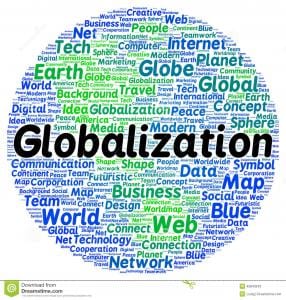
In economics globalization seems inevitable if anything is. But at a recent Vatican meeting of finance ministers and experts,
Meeting participants agreed it was no longer acceptable science to consider any market philosophy or policy as being “natural,” invisible or inevitable, but that economics is all about people picking and choosing specific rules and frameworks. (Catholic News Service article, reprinted in Chicago Catholic)
Pope Francis also spoke at the meeting, sponsored by the Pontifical Academy of Social Sciences.
World leaders may not know it, but economic theory has moved past Milton Friedman style neo-liberalism. That theory proposed that markets, free of state intervention, should operate solely according to laws of supply and demand and the self-interest of supposedly free individuals. Markets may have been free in that system, but individuals definitely were not. (See this post.)
In Being Consumed: Economics and Christian Desire, William T. Cavanaugh says economics is neither an exact science nor a description of anything inevitable. Cultural, moral, and even theological factors are basic to market systems. This fifth post on Cavanaugh’s book covers Chapter 3, “The Global and the Local.” It puts globalization in the context of a philosophical problem, the one and the many. Cavanaugh says Jesus and the Eucharist offer a better solution.
Globalization and a philosophical problem
As a student of philosophy I learned about the problem of the one and the many. It was pretty abstract. Is there one invisible, overarching or underlying principle or reality holding things together and bestowing worth and meaning? Or are the individual things in their wide variety meaningful and good enough by themselves? William T. Cavanaugh brings this philosophical problem down to earth and economics and Jesus and Eucharist. He asks, Has globalization finally reconciled, in its sphere, the many with the one. And is that a good thing?
To the first question the answer could well be, Yes. Two opposite things are happening with globalization—unification and particularization, increasingly wide variety within an increasingly united global system.
Unification
The world’s various, local economic systems are being integrated more and more into one framework. Cavanaugh calls this the end of Fordism. Henry Ford, we were taught in elementary school, dared to pay his employees enough so they could buy the cars they made. Commercial enterprises and local communities thrived together in “factory towns.” (p. 61) Starting in the 1970’s a corporation’s labor market became the whole world. Production, largely overseas with cheap labor, became separate from consumption. In small towns, such as where I live, there is pressure to “buy local.” But,
The new order eschews loyalty to workers, products, corporate structures, businesses, factories, communities, even the nation. (p. 62, quoting the New York Times)
International agreements like NAFTA (new or old version) and GATT (General Agreement on Tariffs and Trade) strike down barriers to free trade. There is “a detachment from the local and a commitment to the hypermobility of capital.” P. 63)
Particularization
Three factors bring the local and the particular back into the picture. Of these, two opposite ones are the rise of fundamentalisms and the move toward multiculturalism. (p. 65-66) Fundamentalism replaces the one with another one. Fundamentalism objects to the world dominating lifestyle. Each variety of fundamentalism promotes its own narrow but “true” worldview and morality. Multiculturalism does the opposite. It replaces the one with many. Multiculturalism rejoices in many different styles of life and regards them all as equally valid. Fundamentalism reacts against the Americanizing and secularizing of the world. Multiculturalism is an especially American and secular phenomenon.
The third particularizing factor works well with multiculturalism. It is the sheer abundance and amazing variety of goods and services that people, at least in affluent societies, can access. On any number of streets in America I can run into a world of music, food, clothing, ways of playing and praying, and all the colors of the people who make these cultures of the world. At a reasonable price, mostly, I can share in any or all of these options.
Take away the narrowness of the fundamentalisms, and we have an integration of the one and the many. One worldwide economic system allows an abundance of particular cultures to exist in close proximity. They can get to know and appreciate each other each other. In terms of one and many, it seems an ideal world that globalization makes possible. But is it?
The triumph of the one
On my shelves I have a beautiful book with the appealing title The Bridge of Stars: 365 Prayers, Blessings and Meditations from Around the World. The bridge metaphor seems to say that we can connect all these beautiful “stars.” At any rate, I can taste a different way of being human each day of the year.
That book is sample of the multicultural smorgasbord that economic globalization holds out for me. I could take up a single option and stick with it, but …
To make a tradition the subject of choice … is to kill it as a tradition. (p. 68)
This economy grows through maximizing choices. It coopts the world’s traditions, the more the better, as offerings for consumption. It has no interest in my actually having any tradition. In fact, best if I don’t but just keep on sampling. Globalization has a way of integrating the one and the many. It swallows up the many. Their differences from each other hardly matter.
I have an image in my mind of all the traditions, cultures, religions, ways of life and thought all over the world. They are arrows aiming at a single target — Truth with a capital T. It’s too grand for any one particular arrow so there must be many. Each of them is true in its own way. None of them is worthy of my final commitment, but by adding one arrow to another to another I can get as close as possible to that distant mark, the One that partly inhabits each particular, the universal Truth.
That’s a formula that works for many religions of the world. For some time I adopted the formula as my own way of living with the variety of world religions. But it’s about the opposite of Christianity.
The concrete universal
“Roman Catholic,” the name of my Christian tradition, sounds like an oxymoron. “Catholic” means universal, one church for the whole world. “Roman” is particular, a culture that often hinders or distorts Christianity’s mission to the rest of the world. But what if “universal” means not gaining acceptance all around the world but rather,
… cohesion around a center that unites the disparate elements in their very diversity. (p. 70-71)
And what if that center is only accidentally a place called Rome but essentially a person? Finally, what if that person is the concrete universal?
Poets deal in concrete universals. There’s a scene, image, event, or ordinary object in which the poet finds a universe of meaning. The poetic urge is
- To see a world in a grain of Sand
- And Heaven in a Wild Flower
- Hold Infinity in the palm of your hand
- And Eternity in an hour. (William Blake, “Auguries of Innocence”)
But an hour isn’t really eternity. Infinity doesn’t fit in the palm of one’s hand. What would be the good of it, anyway, if what the poet says and many similar things were literally true? Then everything would be like everything else. Infinity wherever you turn. There’d be no getting away from it.
If there really is a concrete universal, a place where infinity and the world meet, a particular point in all the world and the expanse of time where totality resides, there can only be one. That point, Christianity says, is Jesus, God in human flesh.
A center isn’t much good unless the world can gather around it. That gathering happens in the Eucharist. With that thought this series of posts on Cavanaugh’s book on “economics and Christian desire” will continue.
Image credit: Dreamstime.com via Google Images












